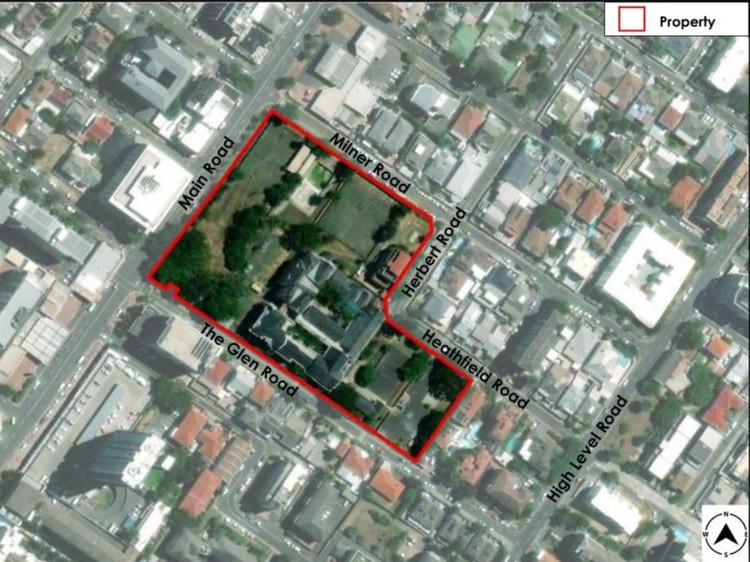
22 May 2025
A satellite image of the Tafelberg site. Image: Western Cape Government (fair use)
The Western Cape government has presented three options for affordable and social housing at the Tafelberg site in Sea Point.
The government had announced its intentions to build affordable housing days before a Constitutional Court hearing earlier this year.
Housing activists have been calling for social housing at the site since 2015.
The planning is still in early stages, with statutory public participation expected to start in March 2026.
The Western Cape Provincial Government has revealed its plans to build affordable and social housing at the long-contested Tafelberg site in Sea Point.
During a public meeting at the Life Conference Centre in Sea Point on Wednesday evening, three options were presented. The options include different combinations of high-end, affordable and social housing. There will also be retail space.
Affordable housing is not subsidised by the government but cross-subsidised by the high-end units and retail space. According to the Western Cape Government’s definition of affordable housing, the units are for households earning less than R22,000 a month. There is no official cap on monthly rental amounts, but government representatives at Wednesday’s meeting said rentals at the Tafelberg site will be kept “as affordable as possible”.
Social housing, on the other hand, is subsidised and regulated by the national Social Housing Regulatory Authority for households earning less than R22,000 a month. Rentals are capped at R6,475 a month.
|
Option 1 |
Option 2 |
Option 3 |
|||||||
|
High-end |
Affordable |
Social |
High-end |
Affordable |
Social |
High-end |
Affordable |
Social |
|
|
Studio |
84 |
37 |
5 |
84 |
67 |
10 |
151 |
80 |
11 |
|
1 Bed |
56 |
24 |
34 |
56 |
45 |
65 |
101 |
53 |
65 |
|
2 Bed |
20 |
10 |
22 |
20 |
19 |
43 |
36 |
23 |
43 |
|
3 Bed |
3 |
0 |
2 |
3 |
0 |
3 |
5 |
0 |
3 |
|
Total |
163 |
71 |
63 |
163 |
131 |
121 |
293 |
156 |
122 |
Three options have been proposed. The numbers in the table refer to the number of units for each type of apartment.
Western Cape Government officials at the meeting stressed that it was still early on in the process and further engagement sessions will take place in June as well as a 30-day comment period. The department says all inputs will be considered before the development concept is finalised by October 2025. A statutory public participation process will begin in March 2026.
In November 2015, the Western Cape Provincial Government announced it would sell the site to the Phyllis Jowell Jewish Day School for R135-million. This was despite the Province having previously earmarked the site for social housing.
The sale sparked a campaign led by housing activist groups Ndifuna Ukwazi and Reclaim the City, which took the government to court. A Constitutional Court ruling is expected to be handed down in the next few months. Days before the court hearing in January, the Western Cape government announced it would use part of the site for social services, and the other part for affordable housing.
Buhle Booi, head of political organising at Ndifuna Ukwazi, attended Wednesday’s meeting. “It’s a victory and we must celebrate that … It’s an encouraging meeting and we hope that everyone can join the call for affordable housing,” he said.
GOOD Party secretary general Brett Herron told GroundUp after the event that even though the proposed social housing yield was lower than he was hoping for, he was “tentatively hopeful that this is the start of a programme of spatial transformation and a commitment to spatial justice that we haven’t seen before from this government.”
He noted that it is still unclear how the other part of the site where the school building currently stands, will be used for “social services”.
Mark McKeon, owner of the Glen Boutique Hotel in Sea Point, said at Wednesday’s meeting that he supported affordable and social housing at the site.
“I have 42 staff who travel to Khayelitsha and other places. I’ve always wanted for them to be able to live closer and to participate in the community,” he said.
Some members of the public asked why the site could not be used as a school again as it was before. Department officials said the area was zoned for residential use.
Concerns were raised by residents over the heritage value of the site and traffic impact. Town planner Rudolf Schröder, appointed by the government, said that an initial heritage study has been done and that the development would require heritage approval. A traffic impact study will also be done, he said.